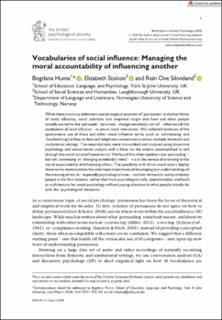| dc.contributor.author | Huma, Bogdana | |
| dc.contributor.author | Stokoe, Elizabeth | |
| dc.contributor.author | Sikveland, Rein Ove | |
| dc.date.accessioned | 2021-02-25T13:21:56Z | |
| dc.date.available | 2021-02-25T13:21:56Z | |
| dc.date.created | 2020-07-16T11:06:05Z | |
| dc.date.issued | 2020 | |
| dc.identifier.citation | British Journal of Social Psychology, 2020, . | en_US |
| dc.identifier.issn | 0144-6665 | |
| dc.identifier.uri | https://hdl.handle.net/11250/2730454 | |
| dc.description.abstract | While there are many definitions and conceptual accounts of ‘persuasion’ and other forms of social influence, social scientists lack empirical insight into how and when people actually use terms like ‘persuade’, ‘convince’, ‘change somebody's mind’ – what we call the vocabularies of social influence – in actual social interaction. We collected instances of the spontaneous use of these and other social influence terms (such as ‘schmoozing’ and ‘hoodwinking’) in face‐to‐face and telephone conversations across multiple domestic and institutional settings. The recorded data were transcribed and analysed using discursive psychology and conversation analysis with a focus on the actions accomplished in and through the use of social influence terms. We found that when speakers use 'persuading' – but not 'convincing' or 'changing somebody’s mind' – it is in the service of orienting to the moral accountability of influencing others. The specificity with which social actors deploy these terms demonstrates the continued importance of developing our understandings of the meaning of words – especially psychological ones – via their vernacular use by ordinary people in the first instance, rather than have psychologists reify, operationalize, and build an architecture for social psychology without paying attention to what people actually do with the ‘psychological thesaurus’. | en_US |
| dc.language.iso | eng | en_US |
| dc.publisher | ohn Wiley & Sons Ltd on behalf of British Psychological Society | en_US |
| dc.title | Vocabularies of social influence: Managing the moral accountability of influencing another | en_US |
| dc.type | Peer reviewed | en_US |
| dc.type | Journal article | en_US |
| dc.description.version | publishedVersion | en_US |
| dc.source.journal | British Journal of Social Psychology | en_US |
| dc.identifier.doi | 10.1111/bjso.12409 | |
| dc.identifier.cristin | 1819564 | |
| dc.description.localcode | © 2020 The Authors. This is an open access article under the terms of the Creative Commons Attribution License, which permits use, distribution and reproduction in any medium, provided the original work is properly cited. | en_US |
| cristin.ispublished | true | |
| cristin.fulltext | postprint | |
| cristin.qualitycode | 1 | |
